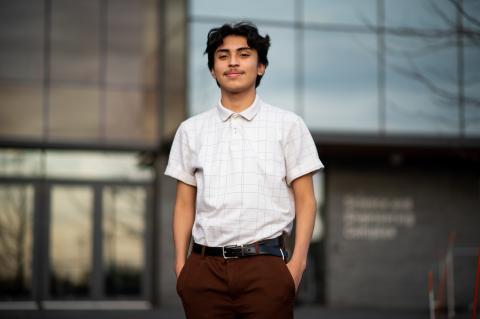Inspired to Engineer a Better Future: David Michel

Optimism and curiosity are twin engines that drive the imagination of young engineers at Tufts, whose professors nurture skills, knowledge, and social awareness to help translate their visions into real-world applications. This year, as Engineers Week celebrates the theme of “Reimagining the Possible,” Tufts Now reached out to five School of Engineering undergraduates and graduate students who are bringing energy and big ideas to a changing world.
David Michel, E24
David Michel, a sophomore studying civil and environmental engineering, envisions a merger of engineering with urban planning to create and sustain more just communities. One of 30 undergraduate students selected for the Visiting and Early Research Scholars' Experience (VERSE), an immersive research and mentorship program, he worked under the advisement of Shomon Shamsuddin, assistant professor in the Department of Urban and Environmental Policy and Planning.
Why civil engineering: I am a first-generation, low-income student from South Central Los Angeles, and when I came to Tufts, I saw my education as helping me to advocate for historically excluded communities. My introduction to engineering opened my eyes to how that is possible, and I have been fortunate that at Tufts my professor encouraged that social activism perspective. There are many different avenues that I could take after Tufts, but whatever I do, my main goal is to impact a community in a positive way. That’s one reason for why I chose civil engineering: it's one of the most direct ways you can affect people. Roads, bridges, highways—civil engineers make them possible.
A big idea: To me, both urban planners and civil engineers have a responsibility to engage with and understand the community where they're working, and they need to be more collaborative professionally. It would be even better if policy makers have some engineering experience—and vice versa—so that they understand the big implications of what they're doing. It is my hope that historical policies and zoning laws that have hurt specific communities can be changed or reversed. We need to intentionally merge policies with civil engineering so that communities that have been historically ignored and mistreated are able to thrive. I'm from Los Angeles, which has a large, very intricate systems of freeways and highways. For engineers, that's a marvelous feat to accomplish, right? But a lot of these transportation systems have a negative impact on lower income communities and often communities of color; they impact the values of equity and social justice.
Why progress matters: Working with Dr. Shamsuddin has helped me think more deeply about the social impact of engineering and policy, specifically around issues of poverty and homelessness. I learned that federal programs like the Housing Opportunities for People Everywhere [HOPE VI] program sought to address the poor conditions of public housing projects across the country by revitalizing them into mixed-income developments in order to “build more sustainable communities.” But in some cases, fewer units were rebuilt than originally were there, meaning that some people were forced to seek shelter elsewhere. And with the current trend of building more luxury rental housing, households with modest incomes are left with little to no housing options. Lack of affordable housing is just one example of a social issue that can be addressed by both local policy makers and civil engineers with support from the federal government. I believe that the engineers of today and of the future have a responsibility to respect the needs of not only the present community but also of those communities that came before them. Past decisions did not consider all voices, and we must now prioritize those unheard voices to begin correcting those wrongdoings.
This excerpt is from "Inspired to Engineer a Better Future" by Laura Ferguson, Tufts Now.
Learn more about undergraduate programs Learn more about graduate programs Take a virtual tour of campus
Department:
Civil and Environmental Engineering